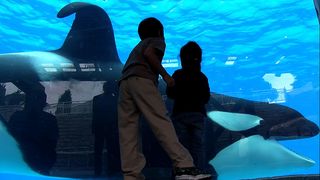Empathy
When Bands Bolt: Is SeaWorld the New Sun City?
The Blackfish Effect & Apartheid Unleash Empathy (Part 1)
Posted December 23, 2013

As the world bid farewell to Nelson Mandela—“one of the most influential, courageous and profoundly good human beings that any of us will share time with on this Earth," said President Obama…and a leader who showed the world the true power of non-violent action against suffering and injustice—something deeply relevant was happening. World famous rock and country bands were cancelling their upcoming performances at SeaWorld Orlando’s annual Bands, Brews, and Barbecues Festival. In fact, they were leaping like passengers from a burning ship.
“The exodus first began on November 27 when the group Barenaked Ladies announced that they were withdrawing from their gig slot because of the Blackfish movie,” reports Elizabeth Batt at Digital Journal. Just three weeks later (with Mandela’s death on December 5 marking a kind of tipping point), eight of the ten famed bands are out. Willie Nelson, Heart, Cheap Trick, 38 Special, REO SpeedWagon, Martina McBride, and Trisha Yearwood all dumped their scheduled performances, some specifically citing their concerns raised by Blackfish.
What’s more, other artists have asked SeaWorld to stop using their music during Shamu shows. Joan Jett, whose “I Love Rock and Roll” accompanies orca shows in Shamu Stadium, wrote in a letter to SeaWorld, “I'm among the millions who saw Blackfish and am sickened that my music was blasted without my permission at sound-sensitive marine mammals.” Darren Hayes of “Savage Garden” and Edgar Winter of “Free Ride” also want their music purged from SeaWorld shows.
With their protest, these bands and musicians have entered a venerable “Hall of Fame” of artists who’ve used their own renown and non-violent action to leverage widespread public education of suffering or injustice. What’s remarkable given the timing of Mandela’s passing, is the parallel between the top-line bands ditching SeaWorld and the Artists Against Apartheid protest movement started in 1985, and rolled out with Steven Van Zandt’s protest song, Sun City. The ASA (and the song) included dozens of top-label musicians—fueled by their drive for justice—including Hall and Oats, Pat Benetar, Peter Gabriel, Bruce Springsteen, Ringo Starr, Bonnie Raitt, and Bob Dylan. All these artists vowed not to play in South Africa’s Sun City as a statement of their solidarity with those impacted by the brutalities of apartheid. Danny Schechter, a journalist with ABC News at that time wrote that Sun City was, “a song about change not charity, freedom not famine.
The Sun City lyrics, too, are deeply relevant.
We're rockers and rappers united and strong
We're here to talk about South Africa we don't like what's going on
It's time for some justice it's time for the truth
We've realized there's only one thing we can doI ain't gonna play Sun City
Relocation to phony homelands
Separation of families I can't understand
23 million can't vote because they're black
We're stabbing our brothers and sisters in the back.
Then there was the ASA’s now legendary sister movement: the “We Are the World” artists’ crusade to end famine in Africa. That song, driven by global empathy for the suffering of others, topped music charts internationally and became the fastest-selling American pop single in history. And that sweeping tide of compassion traces its roots, via visionary Harry Belafonte, to “Do They Know It’s Christmas?” performed by Band-Aid, a UK supergroup of rock stars who used their music to raise money for anti-poverty efforts in Ethiopia.
These are the "Do The Know It's Christmas" lyrics, the ones that inspired so much to come:
It's Christmastime; there's no need to be afraid
At Christmastime, we let in light and we banish shade
And in our world of plenty we can spread a smile of joy
Throw your arms around the world at Christmastime
But say a prayer to pray for the other ones
At ChristmastimeIt's hard, but when you're having fun
There's a world outside your window
And it's a world of dread and fear
Where the only water flowing is the bitter sting of tearsAnd the Christmas bells that ring there
Are the clanging chimes of doom
Well tonight thank God it's them instead of you
And there won't be snow in Africa this ChristmastimeThe greatest gift they'll get this year is life
Oh, where nothing ever grows, no rain or rivers flow
Do they know it's Christmastime at all?
Feed the world
Feed the world
Let them know it's Christmastime again
Perhaps Danny Schechter would’ve changed the last lines to “free the world.”
Like so many other artists before them, these eight bands ditched SeaWorld because the truth is out. Psychologically speaking, they'd (and/or the many fans who petitioned them) witnessed suffering and injustice via the movie Blackfish, deeply empathized with its victims, experienced a natural outrage response, and taken action. The powerful effect of mirror-neurons in the brain had once again shifted the tide of history...and SeaWorld, in a remarkable defensive posture, took out full-page ads in newspapers across the country on December 20, in an attempt to mollify a disturbed public (and see Part 2). Even Cash, a now six-year-old boy who watched Blackfish, made a short video asking people to boycott SeaWorld on his birthday, December 22. And they did: in three different national locations. Meanwhile, across the Atlantic the UK's Daily Mail reported on Sunday's boycott in Orlando, quoting protestors as saying killer whale shows are a "form of slavery."
But not un-like the apartheid-enforcing National Party in South Africa, SeaWorld has failed to respond in any meaningful way (see Blackfish Friday and Part 2). Blackfish smacked the glossy distortions of SeaWorld wide open, while David Kirby’s paradigm-shattering book Death at SeaWorld sealed its fate by casting a tremendous spotlight on corporate truths that the company has so-far managed to keep hidden. And many, many others are helping spread the facts beyond the corporate spin. Just today, in response to the ads SeaWorld ran last week, the Oceanic Preservation Society (the filmmakers of the Academy Award winning documentary The Cove) issued a research-backed Open Letter that begins: "Inaccurate reports from SeaWorld recently placed in full-page advertisements in major newspapers included a series of mistruths about the quality of life of the animals in its care."
Thus, the bands’ exodus from SeaWorld confirms that it’s not too early to link what has become known as the "Blackfish Effect” to a moral uprising akin to the one that eventually overthrew apartheid. As the bands cancelled their gigs, and just three days before Mandela’s death, the Non-Human Rights Project filed a lawsuit in New York to “fundamentally overthrow” the distinction between humans and chimpanzees; a lawsuit that asks the courts to consider our closest living relatives as “persons.” Steven M. Wise, the lead attorney, “believes that the historical use of habeas corpus lawsuits as a tool against human slavery offers a model for how to fight for legal rights for nonhumans,” wrote James Gorman in the New York Times.
The “case relies heavily on science. Nine affidavits from scientists that were part of the court filings offer opinions of what research says about the lives, thinking ability and self-awareness of chimpanzees…Mr. Wise argues that chimps are enough like humans that they should have some legal rights… The suits asked that the chimps be freed to go to sanctuaries where they would have more freedom.”
Meanwhile, last spring, India declared that cetaceans are non-human persons, permanently banning their captivity.
Back at SeaWorld, the whales known as Shamu (see Shamu the Slut) will perform this Christmas, as they do every year, in a concrete tank, far removed from their families (see A Better Way to See Orcas, a short video that explains wild family life verus and captive life for killer whales). They’ll do tricks for food, performing for human families who pay a lot of money for the thrill of seeing killer whales up close. From SeaWorld Orlando’s holiday line-up for 2013:
“The Shamu family of killer whales star in Shamu® Christmas Miracles, an evening show that features holiday music, soaring theatrics and a heart-warming story. Live animals share the stage with puppets in O Wondrous Night, a show based on The Christmas Story and featuring more than 30 carols.”
But as Elizabeth Batt writes, “Unfortunately, the only resemblance to Santa Claus that Shamu bears, is the ability to appear everywhere at once. She's performing at SeaWorld parks in Orlando, San Diego and San Antonio all at the same time…The original Shamu was ripped from her family after being captured in Puget Sound Washington. She died Aug. 23, 1971 from a blood infection after just six years in captivity.”
Somehow, I doubt Shamu knows it’s Christmas.
Join the Mothering Nature conversation on Facebook and Twitter, and unleash your epic force for harmony on Earth.
© Rachel Clark. Reprint with the specific permission of the author.
A note on comments: I read and dearly appreciate every comment. I rarely respond in honor of devoting my time to writing, family, and community. Your comments are important to me, and may inspire future posts. If comments are disrespectful of basic and established science, civil discourse, or kindness, I will remove them.




